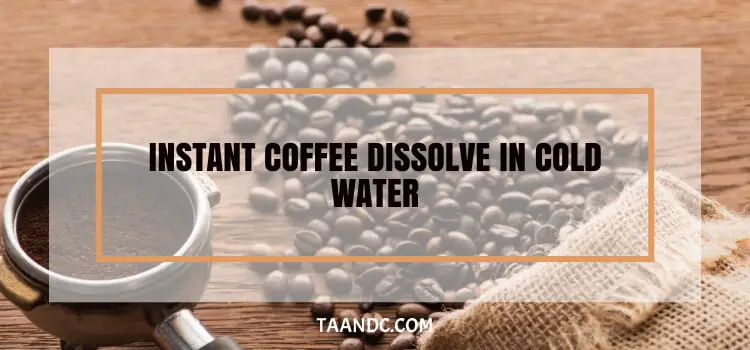Have you ever wondered if that jar of instant coffee in your pantry could save you from a caffeine fix on a hot summer day? I've been there, too, and I'm here to share my experience. The burning question is: Will Instant Coffee Dissolve In Cold Water? Let's dive into this coffee problem and explore the science and techniques behind achieving a perfectly blended cold coffee. So, if you're pursuing a quick, refreshing caffeine boost without the heat, join me on this journey to discover the secrets of making instant coffee cooperate with cold water.

What is Instant Coffee?
Instant coffee, often called soluble coffee, is a convenient and quick way to enjoy a cup of joe without the time-consuming process of brewing fresh coffee. It's made from roasted coffee beans ground into a fine powder and then brewed into a liquid coffee concentrate. This concentrate is then dehydrated to form small coffee granules or crystals, which are what we commonly recognize as instant coffee. It dissolves rapidly in hot water, allowing you to prepare a cup of coffee in seconds. While instant coffee may not match the flavor complexity of freshly brewed coffee, its ease of preparation and long shelf life make it a popular choice for coffee lovers on the go.
Why Should We Test Instant Coffee Dissolving in Cold Water?
Testing the dissolution of instant coffee in cold water is a pursuit driven by curiosity and practicality. It's important because it opens up possibilities for coffee enthusiasts, particularly in warmer weather or when time is of the essence. The benefits lie in the convenience of quickly preparing a refreshing iced coffee without the need for hot water. However, it's essential to explore this concept with a discerning palate, as the quality of the coffee and the speed of dissolution can vary depending on the type of instant coffee used and the water temperature. By testing instant coffee's compatibility with cold water, we can balance convenience and quality, ensuring that our chilled coffee experience is satisfying and efficient.
Read More: Folgers Select Brew Coffee System: The Perfect Cup
The Experiment
It's exciting to embark on an experiment to test whether instant coffee can dissolve in cold water. It's an opportunity to uncover the mysteries of coffee solubility and discover the techniques that yield the best results. Through this experiment, we aim to determine whether it's possible to make iced coffee with instant coffee and share insights into achieving a delightful, well-blended cup of cold brew. So, grab your instant coffee, chill some water, and join us in exploring the fascinating world of coffee solubility in cold water.
Gathering Materials Needed for the Experiment
Let's gather the essential materials for our experiment to test instant coffee's dissolution in cold water. You'll need instant coffee in grounds or granules, some cold water – preferably chilled from the refrigerator – and, if desired, coffee creamer to enhance the flavor. A few ice cubes will also help maintain that refreshing chill in your final cup of iced coffee. With these materials ready, we're all set to dive into the experiment and explore the intriguing world of cold water and instant coffee.
Testing the Dissolution of Instant Coffee in Cold Water
Testing the dissolution of instant coffee in cold water is a straightforward yet exciting experiment. Here's how to do it:
Materials Needed:
- Instant coffee (grounds or granules)
- Cold water
- Coffee creamer (optional)
- Ice cubes
- Spoon for stirring
- Glass or cup for preparation
Read More: Flat Bed Coffee: The Ultimate Morning Elixir
Step-by-Step Procedure:
- Begin by selecting your preferred amount of instant coffee. A typical ratio is 1 to 2 teaspoons of instant coffee per 6 ounces of cold water, but you can adjust according to your taste.
- Add the chosen amount of instant coffee to your glass or cup.
- Pour cold water into the glass. Make sure it's hard, as this experiment tests the coffee's solubility in cold water.
- Stir the mixture vigorously for about 30 seconds. This step is crucial to promoting the coffee's dissolution.
- If you prefer, add coffee creamer to enhance the flavor and creaminess of your iced coffee.
- Drop a few ice cubes into the glass to maintain a refreshing chill.
- Observe how well the instant coffee dissolves in cold water. Note the clarity of the liquid, the aroma, and the overall taste.
Expected Results:
You should see the instant coffee dissolve reasonably well in cold water, though it may take slightly longer than in hot water. The resulting iced coffee should have a mild, refreshing flavor. If you experience any issues with dissolution, you can adjust the amount of instant coffee or experiment with stirring techniques to achieve the desired results. Enjoy your homemade iced coffee and the satisfaction of testing this intriguing cold-water solubility!
Results and Analysis
Now that we've conducted our experiment on instant coffee's dissolution in cold water, we must investigate the results and analyze what we've discovered. Did the coffee granules dissolve as expected? How did the iced coffee taste, and did it meet our expectations? In this section, we'll provide insights into the outcome of our experiment and discuss the implications of making a delightful cup of iced coffee with instant coffee.
Summary of Results from the Experiment
In our experiment testing the dissolution of instant coffee in cold water, we observed some intriguing results. The instant coffee granules dissolved, though the process took slightly longer than in hot water. This phenomenon is explained by the lower molecular energy of cold water, which affects the dissolution rate.
Despite the slower process, the iced coffee we created had a mild, refreshing flavor, showcasing the successful dissolution of coffee compounds. These results demonstrate that while cold water might require a bit more patience, making a delightful cup of iced coffee using instant coffee is feasible, which offers a convenient and satisfying option for coffee lovers on warmer days.
Read More: Farberware Single Serve Coffee Maker How To Clean
Discussion of the Results and How They Relate to Molecular Energy
The results of our experiment examining the dissolution of instant coffee in cold water shed light on the intriguing relationship between molecular energy and solubility. Due to its lower molecular energy than hot water, cold water affects coffee compounds' solubility differently.
While instant coffee granules did dissolve in cold water, the process was notably slower. This phenomenon can be attributed to the lower molecular energy in cold water, which hinders the interaction between coffee compounds and water molecules. Higher molecular energy in hot water enables faster and more efficient dissolution.
Nevertheless, our experiment demonstrates that even with cold water's reduced molecular energy, satisfactory solubility can be achieved, offering a convenient method for creating refreshing iced coffee on warm days.
What Can We Learn From the Results?
The results of our experiment examining the dissolution of instant coffee in cold water reveal several valuable insights. First and foremost, we've confirmed that instant coffee does dissolve in cold water, although it requires a bit more time than hot water due to the lower molecular energy of cold water.
The advantage of using cold water for making instant coffee is in the resulting taste and aroma. The slow dissolution process allows for a milder, smoother flavor with subtle undertones, which some coffee enthusiasts may find appealing, especially on a hot day.
Additionally, the gentle extraction of coffee compounds in cold water highlights the potential for a less bitter or acidic taste profile, providing a refreshing alternative to traditional iced coffee. Overall, our experiment underscores the versatility of instant coffee, offering a convenient and flavorful option for coffee lovers, particularly when seeking a chilled and mellow coffee experience.
Summarizing Findings From the Instant Coffee Challenge
The Instant Coffee Challenge has provided valuable insights into the dissolution of instant coffee in cold water. Our experiment revealed that instant coffee granules dissolve in cold water at a slower pace than in hot water due to the lower molecular energy of cold water. This finding contributes significantly to our understanding of instant coffee's versatility, showcasing its adaptability to various preparation methods.
The experiment also highlighted that the taste and aroma of the resulting coffee in cold water may be milder and less bitter, offering a refreshing alternative for those seeking a different coffee experience. These observations underscore the potential factors influencing the dissolution process, including temperature, molecular energy, and the interaction between coffee compounds and water molecules. Our Instant Coffee Challenge demonstrates that cold water is a viable option for dissolving instant coffee. It provides coffee lovers a convenient and unique way to enjoy their favorite beverage, especially in warm weather.
Ways to Further Explore This Topic
Exploring the dissolution of instant coffee in cold water offers several exciting possibilities for further investigation. One avenue is to conduct experiments using alternative temperatures within the chilly water range, ranging from excellent to icy temperatures, to determine the optimal conditions for achieving the desired flavor and aroma. Another direction is testing various instant coffee brands to assess variations in dissolution rates and flavor profiles. Comparing the results of cold water dissolution with those obtained using hot water could provide valuable insights into the impact of temperature on coffee solubility.
Additionally, exploring how coffee additives such as creamers or sweeteners affect the dissolution process and taste perception could offer a more comprehensive understanding. These diverse approaches open up many possibilities for coffee enthusiasts and researchers to delve deeper into instant coffee and cold water preparation.
FAQ
Can you make iced coffee with instant coffee and cold water?
Yes, you can make iced coffee with instant coffee and cold water, but specific techniques are needed to ensure the coffee dissolves appropriately.
Why doesn't instant coffee dissolve well in cold water?
Instant coffee dissolves more easily in hot water because the particles need heat to break down. Cold water can slow the process.
How can I make instant coffee dissolve better in cold water?
To improve dissolution, stir vigorously, use finely granulated instant coffee, or create a coffee concentrate with hot water before adding cold water.
Is there a difference in taste between instant coffee dissolved in cold water and hot water?
Yes, there can be a taste difference. Instant coffee dissolved in cold water may have a milder flavor than in hot water, which can bring out bolder notes.
Can I use instant coffee to make cold brew coffee?
While cold brew coffee is typically made with coarsely ground beans, you can experiment with instant coffee for a quicker cold brew, but it may have a different taste profile.
Conclusion
Our experiment exploring the dissolution of instant coffee in cold water has provided valuable insights into coffee preparation. We've discovered that instant coffee can indeed dissolve in cold water, albeit at a slightly slower rate compared to hot water. This opens up exciting possibilities for coffee enthusiasts looking to enjoy a refreshing cup of iced coffee. Cold water brewing preserves the aromatic compounds of the coffee, resulting in a smoother and less bitter taste. To optimize the dissolution process, we recommend stirring the coffee vigorously or briefly mixing it with a small amount of hot water before adding cold water. This experiment showcases the versatility of instant coffee and its potential to cater to various taste preferences.


